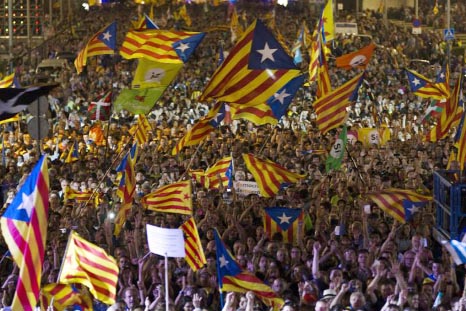
Across Europe, people are watching the independence referendum Spain’s Catalonia region plans to hold Sunday closely and nervously, but quietly.
A strong turnout that results in a majority vote for the “yes” side could embolden other breakaway-minded regions. A secession trend on the continent would put new strains on the European Union and carry the potential for unleashing violence.
Yet most European leaders have shied away from taking a public stand on the upcoming referendum.
Despite tensions behind the scenes, they’re reluctant to back either the Catalan separatists who are bucking Spanish law to conduct the balloting or Prime Minister Mariano Rajoy’s heavy-handed efforts to block the vote.
Here’s a look at how other European countries – and Venezuela’s outspoken leader – view the situation in Catalonia:
While the vote hasn’t inspired mass public rallies or viral social media campaigns outside of Spain, it did prompt small demonstrations in Scotland, where many dream of obtaining independence from the U.K.
Scottish First Minister Nicola Sturgeon has shown clear, if muted, support for the Catalonia vote.
Sturgeon, who leads the Scottish National Party, called it “entirely legitimate for Spain to oppose independence for Catalonia,” but told lawmakers last week: “The right to self-determination is an important international principle, and I hope very much it will be respected in Catalonia, and everywhere else.”
Secession-leaning figures in Belgium’s Flanders region see hope in Sunday’s vote and sympathize with prosperous Catalonia’s complaints that it subsidizes poorer regions of Spain.
“I think there is already a dynamic (toward independence around Europe). You only have to look at Scotland. It’s an evolution that no European government can avoid,” Jan Peumans, speaker of Belgium’s Flanders regional parliament, said.
Italy’s far-right Northern League, which has spearheaded referendums for more autonomy in northern Lombardy and Veneto, spoke out against the recent arrests of Catalan leaders ordered by Spain’s government.
Catalonia’s independence movement also received unexpected backing from Venezuelan President Nicolas Maduro, who recently won a referendum that consolidated his powers and has been criticized by the Rajoy government in Spain.
The silence from the European Union over developments in largely pro-European Catalonia has been especially conspicuous since Catalan officials appealed to the bloc to mediate the dispute.
In response to the region’s requests for intervention, the European Commission – the EU’s executive arm – repeated that the referendum was an internal Spanish affair and that it respected Spain’s constitutional order.
EU officials refused to engage even as concerns mounted Friday about post-vote violence. “We will, as everybody else, be watching events unfolding,” commission spokesman Alexander Winterstein said.
Privately, officials are slightly more forthcoming about their fears.
“We are following the whole process with great, great concern,” a senior EU official said last week. The official briefed reporters on condition that she not be named.
Denmark has been non-committal. The Faroe Islands and Greenland – two Danish semi-autonomous territories – have floated the idea of breaking away.
The Faroes plan to hold a referendum on a new constitution in April.
Russia has largely ignored Catalonia’s vote. While some have used the vote to point out Europe’s weaknesses, Moscow is not disposed to alienate Rajoy’s government since Spain has been one of the friendliest countries toward Russia since it annexed Crimea.
Even Serbia, still smarting from the 2008 secession of Kosovo, hasn’t explicitly backed the Spanish government – even though Spain is one of the five EU states that doesn’t recognize Kosovo’s independence.
TREADING CAREFULLY WITH RAJOY
Rajoy has alienated potential political supporters by sending in police to block the vote. No other European leader has come out definitively against the referendum, a likely disappointment to the Spanish leader.
His clearest backing came from French President Emmanuel Macron, whose country has faced low-level breakaway sentiment from Corsica and Basque Country in the southwest.
“I know a partner and a friend, which is Spain, Spain as a whole. I have an interlocutor and he is here by my side and his name is Mariano Rajoy. The rest does not concern me,” Macron was quoted in French media as saying at a June meeting with Rajoy.
Others are treading more carefully.
At an EU summit in Estonia on Friday, Lithuania’s President Dalia Grybauskaite was her usual forthright but succinct self when asked about the situation in Spain: “Not easy. Sensitive. But we wish Spain to stay strong.”
Powerful Germany is playing it safe.
“We have a great interest in Spain’s stability being maintained,” German government spokesman Steffen Seibert told reporters in Berlin.
Even one of Rajoy’s closest EU allies, European Parliament president Antonio Tajani, has refused to explicitly back him and instead called for more dialogue – suggesting Rajoy hasn’t done enough to find a solution.
“I think it’s important to talk on a political level after Monday and to respect laws – Catalan laws and Spanish laws,” Tajani told reporters Friday.
He said he hoped there would be no violence Sunday. “The rules of politics can’t be with violence,” he said.

